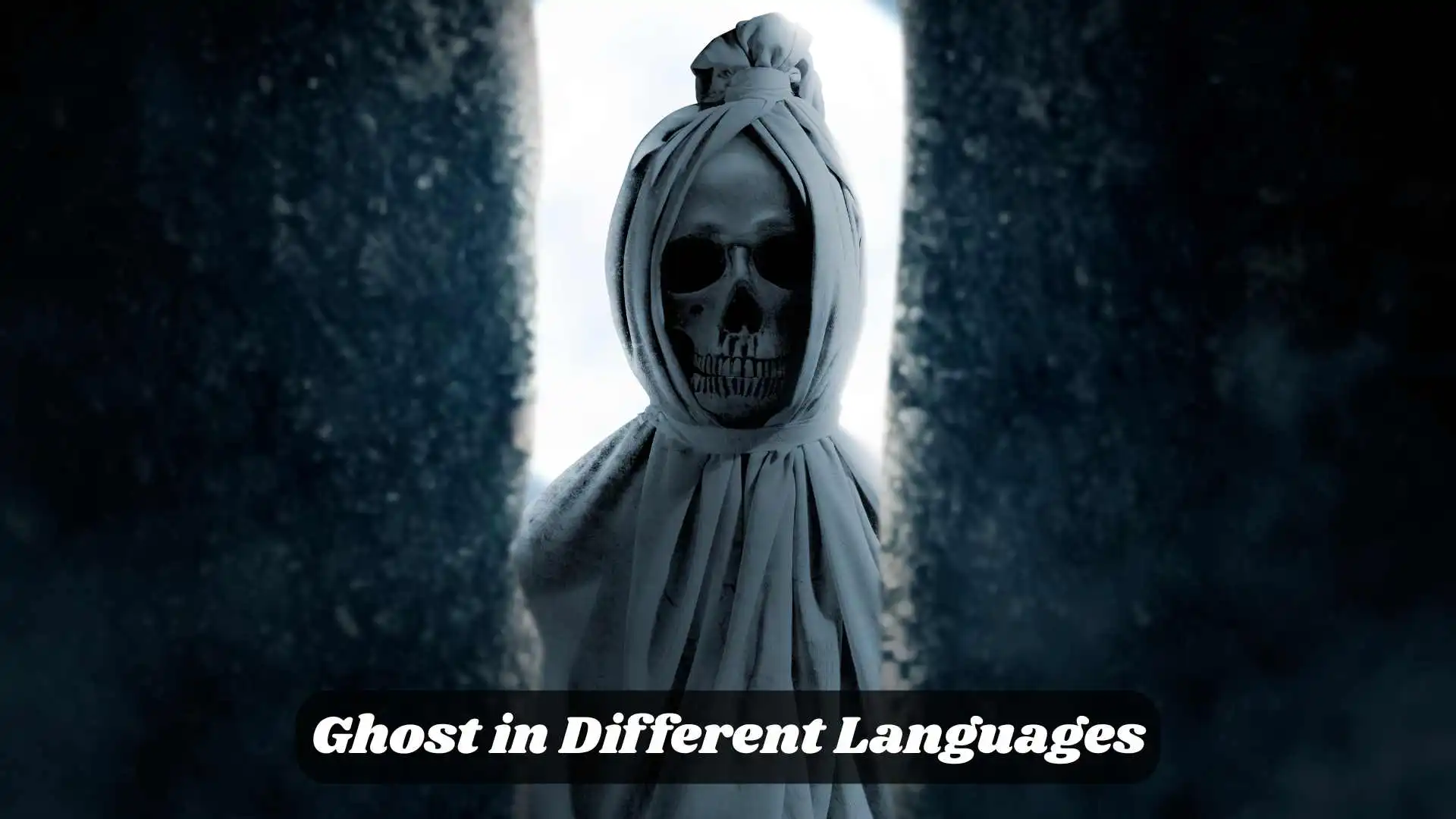Have you ever wondered how people around the world say “Ghost”?
Whether it’s the spooky figure in bedtime stories or the mysterious spirit in ancient legends, this word carries both fear and fascination in every culture.
In this article, we’ll uncover Ghost in Different Languages, exploring how various countries express this haunting yet intriguing concept in their own unique ways.
This guide is written just for you — the curious reader who loves discovering the hidden meanings behind words.
As you explore, you’ll not only find translations and pronunciations but also learn how different languages shape the idea of a “ghost” through their traditions and tales.
So, get ready to travel through languages, cultures, and a touch of mystery — and see how the word ghost connects us all across the world.
🌍 How to Say Ghost in 70 Different Languages
- English (🇬🇧) – Ghost | Pronunciation: gohst
Example: The old house is said to be haunted by a ghost. - Spanish (🇪🇸) – Fantasma | Pronunciation: fan-TAS-ma
Example: Dicen que el castillo tiene un fantasma. (They say the castle has a ghost.) - French (🇫🇷) – Fantôme | Pronunciation: fahn-TOM
Example: Le fantôme errait dans les couloirs. (The ghost wandered through the halls.) - German (🇩🇪) – Geist | Pronunciation: gyst
Example: Der Geist erschien im alten Haus. (The ghost appeared in the old house.) - Italian (🇮🇹) – Fantasma | Pronunciation: fan-TAS-ma
Example: C’è un fantasma nella torre. (There’s a ghost in the tower.) - Portuguese (🇵🇹) – Fantasma | Pronunciation: fan-TAS-ma
Example: O castelo é assombrado por um fantasma. (The castle is haunted by a ghost.) - Russian (🇷🇺) – Призрак (Prizrak) | Pronunciation: PREEZ-rak
Example: Старый дом был полон призраков. (The old house was full of ghosts.) - Chinese (Mandarin) (🇨🇳) – 鬼 (Guǐ) | Pronunciation: gway
Example: 那个地方有鬼。 (That place has a ghost.) - Japanese (🇯🇵) – 幽霊 (Yūrei) | Pronunciation: yoo-RAY
Example: 彼は幽霊を見たと言った。 (He said he saw a ghost.) - Korean (🇰🇷) – 유령 (Yuryeong) | Pronunciation: yoo-RYUNG
Example: 유령이 집 안에 나타났다. (A ghost appeared in the house.) - Arabic (🇸🇦) – شبح (Shabah) | Pronunciation: SHA-bah
Example: يقال إن المكان مسكون بشبح. (It is said the place is haunted by a ghost.) - Hindi (🇮🇳) – भूत (Bhoot) | Pronunciation: bhoot
Example: वह पुराना किला भूतिया है। (That old fort is haunted.) - Urdu (🇵🇰) – بھوت (Bhoot) | Pronunciation: bhoot
Example: پرانے گھر میں بھوت دکھائی دیا۔ (A ghost appeared in the old house.) - Turkish (🇹🇷) – Hayalet | Pronunciation: hah-yah-LET
Example: Hayalet geceleri dolaşıyordu. (The ghost roamed at night.) - Greek (🇬🇷) – Φάντασμα (Fántasma) | Pronunciation: FAHN-tahs-ma
Example: Το φάντασμα εμφανίστηκε ξαφνικά. (The ghost appeared suddenly.) - Hebrew (🇮🇱) – רוּחַ רְפָאִים (Ruach Refa’im) | Pronunciation: roo-akh reh-fah-EEM
Example: הם סיפרו על רוח רפאים בבית. (They spoke of a ghost in the house.) - Thai (🇹🇭) – ผี (Phī) | Pronunciation: pee
Example: มีผีอยู่ในบ้านหลังนั้น. (There’s a ghost in that house.) - Vietnamese (🇻🇳) – Ma | Pronunciation: mah
Example: Cô ấy tin vào ma. (She believes in ghosts.) - Swahili (🇰🇪) – Kivuli | Pronunciation: kee-VOO-lee
Example: Wanasema kivuli kinaishi pale. (They say a ghost lives there.) - Zulu (🇿🇦) – Idlozi | Pronunciation: eed-LOH-zee
Example: Idlozi lalivela ebusuku. (The ghost appeared at night.) - Polish (🇵🇱) – Duch | Pronunciation: dookh
Example: W starym domu straszy duch. (A ghost haunts the old house.) - Dutch (🇳🇱) – Geest | Pronunciation: hayst
Example: Er spookt een geest in het kasteel. (A ghost haunts the castle.) - Swedish (🇸🇪) – Spöke | Pronunciation: SPUR-keh
Example: Ett spöke bor i det gamla huset. (A ghost lives in the old house.) - Finnish (🇫🇮) – Kummitus | Pronunciation: KOOM-ee-toos
Example: Vanhassa talossa on kummitus. (There’s a ghost in the old house.) - Hungarian (🇭🇺) – Szellem | Pronunciation: SELL-em
Example: A házban szellem jár. (A ghost walks in the house.) - Czech (🇨🇿) – Duch | Pronunciation: dookh
Example: Starý dům straší duch. (A ghost haunts the old house.) - Romanian (🇷🇴) – Fantomă | Pronunciation: fan-TOH-mah
Example: Fantoma a apărut în noapte. (The ghost appeared at night.) - Ukrainian (🇺🇦) – Привид (Pryvyd) | Pronunciation: PREE-veed
Example: Вони бачили привид у замку. (They saw a ghost in the castle.) - Persian (🇮🇷) – روح (Ruh) | Pronunciation: roo
Example: گفته میشود روحی در آن خانه است. (It’s said a ghost is in that house.) - Malay (🇲🇾) – Hantu | Pronunciation: HAHN-too
Example: Rumah itu dikatakan ada hantu. (That house is said to have a ghost.) - Indonesian (🇮🇩) – Hantu | Pronunciation: HAHN-too
Example: Hantu muncul di malam hari. (A ghost appeared at night.) - Filipino (🇵🇭) – Multo | Pronunciation: mul-TOH
Example: May multo raw sa lumang bahay. (They say there’s a ghost in the old house.) - Danish (🇩🇰) – Spøgelse | Pronunciation: SPUR-gel-seh
Example: Der bor et spøgelse i huset. (A ghost lives in the house.) - Norwegian (🇳🇴) – Spøkelse | Pronunciation: SPUR-kel-seh
Example: Spøkelset dukket opp i natten. (The ghost appeared in the night.) - Slovak (🇸🇰) – Duch | Pronunciation: dookh
Example: V dome sa zjavil duch. (A ghost appeared in the house.) - Slovenian (🇸🇮) – Duh | Pronunciation: dookh
Example: Duh se pojavil ponoči. (The ghost appeared at night.) - Bulgarian (🇧🇬) – Призрак (Prizrak) | Pronunciation: PREEZ-rak
Example: Къщата е обитавана от призрак. (The house is haunted by a ghost.) - Croatian (🇭🇷) – Duh | Pronunciation: dookh
Example: U kući se pojavio duh. (A ghost appeared in the house.) - Serbian (🇷🇸) – Дух (Duh) | Pronunciation: dookh
Example: У кући живи дух. (A ghost lives in the house.) - Bosnian (🇧🇦) – Duh | Pronunciation: dookh
Example: Duh se pojavio u noći. (A ghost appeared at night.) - Estonian (🇪🇪) – Kummitus | Pronunciation: KOOM-ee-toos
Example: Majas elab kummitus. (A ghost lives in the house.) - Latvian (🇱🇻) – Spoks | Pronunciation: spohks
Example: Pils ir pilna spoku. (The castle is full of ghosts.) - Lithuanian (🇱🇹) – Vaiduoklis | Pronunciation: vie-DOO-oh-klehs
Example: Senajame name gyvena vaiduoklis. (A ghost lives in the old house.) - Maltese (🇲🇹) – Spirtu | Pronunciation: SPEER-too
Example: Hemm spirtu fid-dar. (There’s a ghost in the house.) - Icelandic (🇮🇸) – Draugur | Pronunciation: DROW-gur
Example: Draugurinn birtist í myrkrinu. (The ghost appeared in the dark.) - Irish (🇮🇪) – Taibhse | Pronunciation: TEEV-sheh
Example: Chonaic sí taibhse san oíche. (She saw a ghost at night.) - Welsh (🏴) – Ysbryd | Pronunciation: US-brid
Example: Mae ysbryd yn byw yn y tŷ. (A ghost lives in the house.) - Hawaiian (🇺🇸) – ʻUhane | Pronunciation: oo-HAH-neh
Example: ʻAʻole mākou makaʻu i nā ʻuhane. (We are not afraid of ghosts.) - Maori (🇳🇿) – Wairua | Pronunciation: why-ROO-ah
Example: He wairua kei roto i te whare. (There’s a ghost in the house.) - Afrikaans (🇿🇦) – Spook | Pronunciation: spook
Example: Die huis word deur ’n spook gepla. (The house is haunted by a ghost.) - Amharic (🇪🇹) – መንፈስ (Menfes) | Pronunciation: men-fes
Example: ቤቱ በመንፈስ ተያዘ። (The house was haunted by a ghost.) - Bengali (🇧🇩) – ভূত (Bhoot) | Pronunciation: bhoot
Example: পুরনো বাড়িতে ভূত দেখা গেছে। (A ghost was seen in the old house.) - Tamil (🇮🇳) – பேய் (Pey) | Pronunciation: pay
Example: அந்த வீட்டில் பேய் இருக்கிறது. (There’s a ghost in that house.) - Telugu (🇮🇳) – భూతం (Bhootam) | Pronunciation: bhoo-thum
Example: ఆ ఇంటిలో భూతం ఉంది. (There’s a ghost in that house.) - Kannada (🇮🇳) – ಭೂತ (Bhoota) | Pronunciation: bhoo-tah
Example: ಆ ಮನೆಯಲ್ಲಿ ಭೂತ ಇದೆ. (There’s a ghost in that house.) - Malayalam (🇮🇳) – ഭൂതം (Bhootam) | Pronunciation: bhoo-tham
Example: ആ വീട്ടിൽ ഭൂതം ഉണ്ട്. (There’s a ghost in that house.) - Gujarati (🇮🇳) – ભૂત (Bhoot) | Pronunciation: bhoot
Example: એ ઘરમાં ભૂત છે. (There’s a ghost in that house.) - Marathi (🇮🇳) – भूत (Bhoot) | Pronunciation: bhoot
Example: त्या घरात भूत आहे. (There’s a ghost in that house.) - Punjabi (🇮🇳/🇵🇰) – ਭੂਤ (Bhoot) | Pronunciation: bhoot
Example: ਉਸ ਘਰ ਵਿਚ ਭੂਤ ਹੈ। (There’s a ghost in that house.) - Nepali (🇳🇵) – भूत (Bhoot) | Pronunciation: bhoot
Example: त्यो घरमा भूत छ। (There’s a ghost in that house.) - Sinhala (🇱🇰) – භූතයා (Bhootaya) | Pronunciation: bhoo-tha-yah
Example: ඔහු භූතයාව දැක්කා. (He saw a ghost.) - Mongolian (🇲🇳) – Сүнс (Süns) | Pronunciation: soons
Example: Тэнд нэг сүнс байдаг. (There’s a ghost there.)
👻 Conclusion
From bhoot in Hindi to fantôme in French and hantu in Malay, every culture gives ghosts a unique name and story. Whether you see them as protectors, tricksters, or restless spirits, the word ghost continues to haunt languages — reminding us that mystery lives in every tongue.

John Preston is a passionate American author known for his insightful storytelling and thought-provoking narratives. With a deep love for literature and a sharp eye for detail, John crafts stories that not only entertain but also inspire reflection and growth. His modern writing style, combined with relatable characters and real-life settings, has earned him a loyal readership across diverse audiences.
Dedicated to exploring human emotions, relationships, and societal challenges, John brings authenticity and depth to every page he writes. When he’s not working on his next manuscript, you can find him in his cozy office, surrounded by books, a warm cup of coffee by his side, and his laptop always within reach.
Some of his most notable works include:
The Silent Echoes
Chasing the Dawn
Beneath the City Lights
Through his writing, John Preston continues to leave a lasting impact, one story at a time.

